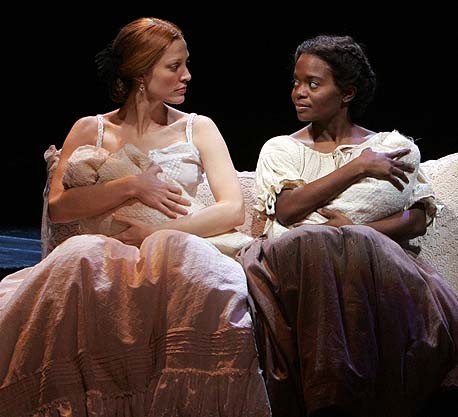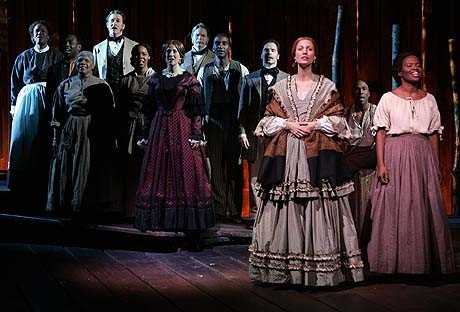Analyzing Names and Power in DESSA ROSE
Analyzing Names and Power in DESSA ROSE
By Kathryn Harris on June 25, 2009
in
Show/Author Spotlight
| Tags:
Show Spotlight
 In the pre-Civil War musical Dessa Rose, songwriting team Lynn Ahrens and Stephen Flaherty (Once On This Island, Ragtime, Seussical) tell the story of the unlikely friendship between escaped slave (and wanted murderer) Dessa Rose, and Ruth, a Southern belle trying to hold her farm together after she is abandoned by her husband.
In the pre-Civil War musical Dessa Rose, songwriting team Lynn Ahrens and Stephen Flaherty (Once On This Island, Ragtime, Seussical) tell the story of the unlikely friendship between escaped slave (and wanted murderer) Dessa Rose, and Ruth, a Southern belle trying to hold her farm together after she is abandoned by her husband.The highs and lows of this friendship and the journey of Dessa Rose are underscored by the authors' use of language and dialogue throughout the piece. The language not only reflects the social dynamics of the time, but also reveals the underlying power struggles between the characters.
Changing a Character's Name
One way the characters of Dessa Rose assert power over others is by mispronouncing other characters’ names. Dessa is constantly called “Odessa;” first by Adam Nehemiah, who interviews Dessa for a book and becomes obsessed with her, and then by Ruth. Both Nehemiah and Ruth persist in their mistake despite Dessa’s repeated correction. “It ain’t Odessa,” she informs them. “It’s Dessa. Dessa Rose. Ain’t no ‘O’ to it.” Nehemiah’s disregard for Dessa’s actual name conveys a great deal about how he views her and her story. Early on in the show, Nehemiah has to convince a pregnant and mutilated Dessa to recount how she first killed her master and then sparked a slave rebellion, as he promised his publisher he’d turn Dessa’s experiences into a book. “The moment you give birth, your baby will be sold, and you will be hung,” he declares.
“I’m asking you, Odessa.
For history, Odessa.
Just think.
You’re on your way to glory.
So leave your child your story.”
Nehemiah claims to be so concerned with Dessa’s legacy, but he can’t even get something as basic as her name right. This simple act of calling Dessa something other than what she calls herself enables Nehemiah to put his mark on her story even before she consents to tell it, indicating that perhaps this book is less about recording Dessa’s story, and more about Nehemiah’s possible fame. “I’ve interviewed some others/But you’re the real prize,” he admits. Even the phrasing he uses to introduce himself to her is incredibly revealing: “I’m Adam Nehemiah…I’ve come to take your story.” From the instant Nehemiah steps into Dessa’s cell, he makes it clear that once she begins to recount it, the slave’s story—and her very identity—will be no longer hers, but his.
Likewise, Ruth’s error asserts her power over Dessa. The first time Ruth calls Dessa “Odessa” in the show is when she walks in on a group of escaped slaves welcoming Dessa to Ruth’s farm. It’s painfully clear to Ruth that she’s intruding; as soon as she enters their quarters, the previously talkative ex-slaves fall silent. Calling Dessa “Odessa” is an easy way to remind them that while Ruth doesn’t own them, they’re very much in her control. This is especially true of Dessa, who already threatened Ruth’s way of thinking when she pointed out that Ruth doesn’t know her nursemaid Dorcas’ real name. Ruth muses:
“Dessa Rose had filled my head with too many thoughts…I thought about Mammy’s real name…And wonderin’ how she must’ve felt, having her name changed like we did. Never being called by her true name…And wonderin’ at the way Mammy always misspoke my name—Ruth Elizabeth…Was that a pet name for a child she loved? Or was she changing my real name in revenge?”
By making Ruth aware of the importance in recognizing a person’s actual name, Dessa forces the former socialite to rethink her relationship with “the person who really brung her up.” As a result, when Dessa yet again reminds Ruth of her powerlessness, Ruth turns to what both she and Dessa know is a clear sign of dominance: she gets Dessa’s name wrong. Nehemiah and Ruth therefore mispronounce Dessa’s name to demonstrate their ownership over her.
Shifting Social Status
Another way Ahrens and Flaherty illustrate the power struggle in Dessa Rose is by linking changing a person’s name with their shifting social status. Not all the escaped slaves address Ruth the same way; nor do they use one form of address exclusively. Generally, the ex-slaves refer to her as “Miz Ruth.” One instructs Dessa that if questioned, she should say “I work for Miz Sutton;” “Miz Ruth” is too casual for a slave to call her mistress. One woman calls Ruth “Miz Lady” behind her back to emphasize Ruth’s lack of control over them and the farm, noting that “Miz Lady think she own this place.” In using the more formal term of address, the former slave contrasts the power Ruth pretends to possess with the little power she actually has. In particular, Dessa’s friend, Nathan, alters what he calls Ruth as they become more intimate with each other, progressing from “Ma’am” to “Ruth”—a declaration of equality that was unheard of in the late 1800s.
Moreover, Dessa and Dorcas are given different names that reflect their status. Nehemiah is so interested in interviewing Dessa due to her fame as the “Devil Woman.” Nathan explains to Ruth that “During that coffee break, [Dessa] jumped on that trader’s back—yellin’ like a banshee, knockin’ him upside his head with a rock…I guess white folks might have thought they was in hell, and she was the devil.” Dessa’s violence and anger is so extreme that her white masters can’t reconcile her behavior even with that of a slave, figuring instead that Dessa must be evil, uncontrollable, and inhuman. While Dessa’s new name lowers her status, Dorcas’ raises hers. Ruth calls Dorcas “Mammy” to illustrate how important Dorcas is in her life, even telling Dessa that Ruth “was like her own child.” Ruth certainly connects more to Dorcas than to her own mother. As her mother bombards her with how a lady ought to behave, Dorcas urges her not to “be in no hurry to grow up so fas’/Don’t be worrying what ladies is s’posed to do.” To Ruth, Dorcas is far more than a slave; she provides the nurturing and support of a family member. Consequently, the different names a person may have clearly reflects changes in their status.
Dessa Rose is a piece about identity—who are you, the writers ask, and what do you leave behind? The answers for the show’s characters, however, are entwined in ownership and status, as even their names can either affirm their power or take it away. When Ruth asks Dessa to call her by her first name at the end of the piece, she does more than offer Dessa a gesture of friendship—she allows Dessa to define for herself who she is.

For more information or to license, visit Dessa Rose on MTI Shows.
To “click” with other Dessa Rose fans, visit MTI ShowSpace.
























